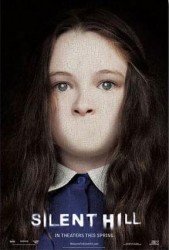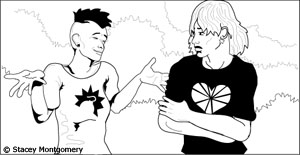Although I had never heard of Graham Linehan before, he’s apparently a writer for some fairly popular UK comedies, including one called The IT Crowd.
Now, apparently there was a recent episode of that show that included a sub-plot involving a transwoman named April. The plot was basically that Douglas, the Asshole of the show, goes out on a date with her and during the date he propositions her. She seems reluctant and eventually tells him that she “used to be a man”, to which he says that it doesn’t matter and his offer still stands. Except, the twist is that he misheard her! He thought that she said she was “from Iran”; this leads to a physical fight where she throws the first punch but he ends it by throwing her through a glass window and the last the audience sees of her is her lying motionless in a pile of glass.
All this played up as comedy, mind you.
So, Graham has a blog and on this blog a commenter named Leanne pointed out to him that he isn’t writing in a vacuum and the kind of violence he used as humor has a real life correlation.
The first comment after hers? A guy telling her that she’s “oversensitive”. So far he’s been the only one and no flame wars have been started, so I suppose that’s something.
Graham’s response to her comment was as follows:
Thanks for the letter, Leanne. I’m sorry you didn’t like the show.
I don’t really feel the need to defend it further as it’s a very silly show, and not meant to be taken seriously. But thank you for remaining polite on a matter that obviously means a lot to you.
Ignoring all the other problems with the response, I find his claim that “it’s a very silly show, and not meant to be taken seriously” to be just another cry of “it’s just a television show!” that I’ve debunked in the past. Not only that, but framing it as an issue of being “taken seriously” or not completely misses the point. Just because people aren’t going to look at the show as something 100% true to life, it doesn’t mean that they won’t find truth in the themes.
Graham’s depiction of violence involving a transwoman that resulted from a sexual encounter where the man thought she was a ciswoman draws from real life situations which are prevalent enough that men who commit these violent acts defend themselves using something termed the trans panic defense. It is with this underlying theme that’s rooted in reality that Leanne was speaking to, rather than the “silly” comedy trappings of the final depiction.
In fact, I would go even further and argue that the humor of the scene is dependent on the audience, at least a little bit, sympathizing with Douglas*. While April is upfront about her past (and I do give Graham minor points for not making her “trick” him into having sex under “false pretenses”), it’s significant that she throws the first punch. By initiating the violence, it lessens Douglas’ fault in the assault and one could argue that it even goes so far as to justify said violence***. And, since the violence is played for laughs, the audience doesn’t have to actually think about sad/scary things like how the same kind of violence happens in real life but with tragic consequences.
Ultimately, Graham is right; he doesn’t have to defend his work. He can write whatever he wants to write as long as the networks are buying it. But I find it to be rather intellectually dishonest for him to use “it’s a very silly show, and not meant to be taken seriously” as an excuse to try and weasel out of the responsibility his writing, as part of a fairly popular television show, plays in not only shaping popular culture but also in reinforcing the beliefs of his audience.
* Darren, the commenter who called Leanne “oversensitive”, argued that it was Douglas who was meant to be the butt of the joke**. While this would seem to fit the way that the show treats Douglas’ character in general, it’s hard to agree that April “gave as good as she got and got the better of him in the end” when he threw her through a glass window and that was the end of it. Or am I missing a part where he actually faced some real consequences like jail time for assault (doubtful since she threw the first punch)? What about even some in-show criticism of his actions from the characters we’re supposed to see as sympathetic?
** Darren also argued that we were supposed to see Douglas’ actions/opinions as bigotry, but I don’t buy that as his views are fairly common. One might argue that those opinions are more extreme than that of the average person, but I’m not so sure. In my experience (which has been backed up by the various research I’ve done into trans* issues) most people I’ve talked to about transwomen believe that transwomen are, if not “men”, at least not fully “women”. In the case of the heterosexual men, most of them say that they would not only not date a transwoman, but if they slept with one and found out later that she was trans they would be “disgusted” and more than a few said that they would want to do violence to her. And, mind you, most of the people I have access to, while not anti-oppression activists, are left-leaning and at least try to be conscious about issues of oppression.
*** For evidence to back up my assertion, I cite Andrew’s comment, where he says, “Leeane – if you recall in the episode, April threw the first punch. She started it and so deserved everything she got.”
 You would think that a movie that has women as the main protagonists would be a progressive step forward in terms of the portrayal of women in film. With Silent Hill, you would be wrong.
You would think that a movie that has women as the main protagonists would be a progressive step forward in terms of the portrayal of women in film. With Silent Hill, you would be wrong.
 Moving away from independent comics and into the world of The Big Two, Kalinara of Pretty, Fizzy Paradise says that she can’t find it in her heart to hate someone who brought such a touching moment of female solidarity in
Moving away from independent comics and into the world of The Big Two, Kalinara of Pretty, Fizzy Paradise says that she can’t find it in her heart to hate someone who brought such a touching moment of female solidarity in 
 And We Shall March laments yet another bastardization of Leguin’s Earthsea series in the post,
And We Shall March laments yet another bastardization of Leguin’s Earthsea series in the post, 
